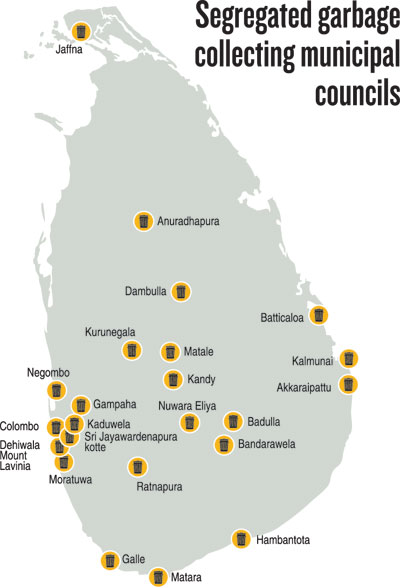News
Keep it simple, expert urges as garbage sorting begins
 A top environmental expert has urged the authorities to keep the new countrywide segregated waste plan simple to give it a chance to work.
A top environmental expert has urged the authorities to keep the new countrywide segregated waste plan simple to give it a chance to work.
All 23 municipal councils will only collect segregated waste from now on, the Minister for Provincial Councils and Local Government, Faiszer Musthapha, said.
People who do not dispose of garbage in the prescribed manner from November 1 will face stern legal action and even army help is being sought to enforce the rules. First-time offenders will be fined up to Rs. 1,000,,second or third-time offenders will be fined up to Rs. 2,000 and repeat offenders will be fined up to Rs. 2,500 for each violation of the regulations.
The aim is to cut garbage landfill by 50-60 per cent by recycling rubbish, Mr. Musthapha said.
“Unless we make segregation at source simple and scalable, it cannot be sustained,” the Central Environment Authority’s (CEA) Director (Waste Management), Ajith Weerasundara, warned. “When we put a simple system in place and make segregation and composting a habit, we will be able to see progress.”
Every day sees 7,500 tonnes of waste generated, the CEA said. About 60 per cent of the waste generated in a home is organic waste, Mr. Weerasundara said.
People have been asked to segregate their organic and inorganic waste, which will be collected separately. The recyclable items include paper, cardboard, polythene, plastic, plastic bottles, glass bottles, metal items, empty yoghurt and ice cream cups, rubberised items, and coconut shells.
“We have been informed that it is compulsory for all citizens and establishments, be it households, apartments, hotels, or restaurants, to sort their garbage before handing it over to garbage collectors,” Colombo Municipal Council (CMC) Commissioner V.A.K. Anura said.
“We have door-to-door collection to ensure each household gives segregated waste.”
The CMC is to distribute two million waste disposal bags to approximately 650,000 households to encourage garbage-sorting, the council’s Director of Solid Waste Management, Yogarani Sylvester, said.
“The problem is there is widespread confusion over what can and cannot be recycled,” Kandy Muncipal Council Commissioner Chandana Tennakoon said. “If just one non-recyclable item is included with recyclable items, the whole bin is effectively contaminated. Councils then have to re-sort it, which is time consuming and very expensive.
“There is no one-size-fits-all solution to waste collection. What works in an inner city suburb won’t necessarily work in the countryside. The types which would suit a large detached house in the country would be completely unsuitable for a high-rise block of flats,” he said.
An official in Jaffna Municipal Council said detailed systems needed to be set up to carry out segregated waste collection and that there are currently no checks in in place to see if contracted collection agents were following specifications.
The Gampaha Municipal Council said it lacked sufficient tractors for garbage collection. Gampaha Municipal Commissioner A. Prasanna said the government had been told about the problem and had promised new waste compacters by next year..
Mr. Musthapha said plans are underway to expand the segregated waste collection programme to urban councils and pradeshiya sabhas after problems have been ironed out.One problem is that workers involved in collection, transportation and disposal of garbage are working without wearing the prescribed rubber gloves, face masks, reflector jackets and safety shoes.

